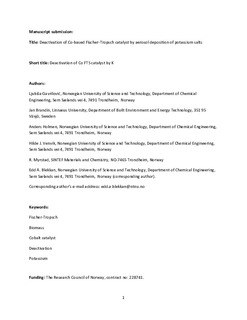Deactivation of Co-Based Fischer−Tropsch Catalyst by Aerosol Deposition of Potassium Salts
Gavrilovic, Ljubisa; Brandin, Jan; Holmen, Anders; Venvik, Hilde Johnsen; Myrstad, Rune; Blekkan, Edd Anders
Journal article, Peer reviewed
Accepted version
Permanent lenke
http://hdl.handle.net/11250/2486443Utgivelsesdato
2018Metadata
Vis full innførselSamlinger
Originalversjon
Industrial & Engineering Chemistry Research. 2018, 57 1935-1942. 10.1021/acs.iecr.7b04498Sammendrag
A 20%Co/0.5%Re/γAl2O3 Fischer−Tropsch catalyst was poisoned by four potassium salts (KNO3, K2SO4, KCl, and K2CO3) using the aerosol deposition technique, depositing up to 3500 ppm K as solid particles. Standard characterization techniques (H2 chemisorption, BET, TPR) showed no difference between treated samples and their unpoisoned counterpart. The Fischer−Tropsch activity was investigated at industrially relevant conditions (210 °C, H2:CO = 2:1, 20 bar). The catalytic activity was significantly reduced for samples exposed to potassium, and the loss of activity was more severe with higher potassium loadings, regardless of the potassium salt used. A possible dual deactivation effect by potassium and the counterion (chloride and sulfate) is observed with the samples poisoned by KCl and K2SO4. The selectivity toward heavier hydrocarbons (C5+) was slightly increased with increasing potassium loading, while the CH4 selectivity was reduced for all the treated samples. The results support the idea that potassium is mobile under FT conditions. The loss of activity was described by simple deactivation models.
